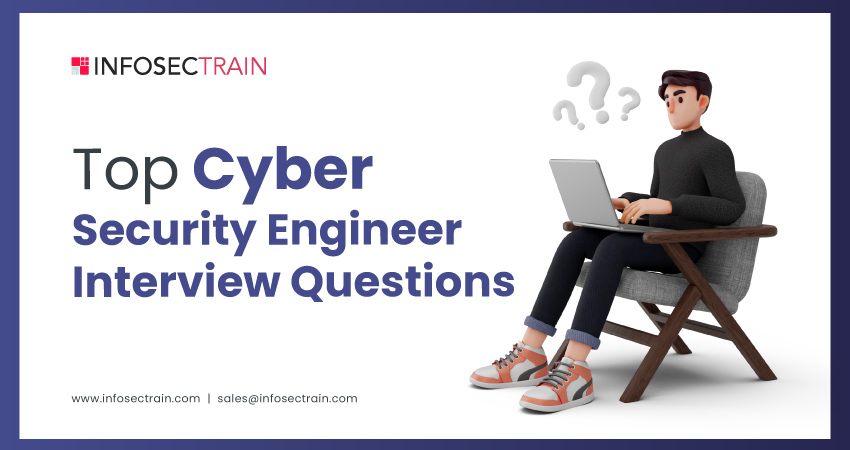Top Cyber Security Engineer Interview Questions
In an era where digital security breaches can bring even the mightiest of enterprises to their knees, the role of Cyber Security Engineers has never been more critical. The demand for these skilled professionals skyrockets as they play a vital role in safeguarding organizations from evolving cyber threats and protecting their financial, operational, and reputational assets. They bring specialized knowledge, skills, and experience to effectively identify vulnerabilities, implement robust security measures, and respond to incidents promptly. These engineers help organizations mitigate risks, protect critical data and systems, and ensure a secure digital environment by keeping up with the latest threats and implementing best practices.

However, facing the interview process is crucial for becoming a Cyber Security Engineer. This article will assist you by presenting frequently asked interview questions for Cyber Security Engineer that will enhance your chances of succeeding in the interview process.
Top Cyber Security Engineer Interview Questions
1. Describe the CIA Triad.
The CIA Triad stands as a cornerstone in information security that represents three core principles of information security: Confidentiality, Integrity, and Availability. These principles help organizations ensure the protection and reliability of their data and systems.
- Confidentiality: It focuses on preventing unauthorized access to sensitive information. It ensures that data is accessible only to authorized individuals or entities.
- Integrity: It ensures that data remains accurate, complete, and unaltered during storage, processing, and transmission.
- Availability: It ensures that information and systems are accessible and operational when needed by authorized users.
2. What is the distinction between a vulnerability, a threat, and a risk?
- Vulnerability refers to a flaw or drawback in a network, system, software, or any component that an attacker can exploit.
- Threat refers to a potential peril or detrimental occurrence that can exploit a vulnerability and harm an organization’s assets or interests.
- Risk is the likelihood or probability of a threat exploiting a vulnerability, potentially affecting an organization’s operations, reputation, finances, or other critical areas.
3. What tools are used for security assessment?
There are several tools used for security assessment. Some common tools include:
- Vulnerability Scanners: Nessus, OpenVAS, and QualysGuard
- Network Scanners: Nmap and Wireshark
- Penetration Testing Tools: Metasploit, Burp Suite, and OWASP ZAP
- Log Analysis Tools: Splunk and ELK Stack
- Web Application Security Tools: Acunetix, OWASP WebScarab, and Nikto
4. What are the differences between SSL and TLS? Which one is more secure?
Transport Layer Security (TLS) and Secure Sockets Layer (SSL), are cryptographic protocols that establish secure connections over a network. TLS is the successor to SSL, with newer versions addressing vulnerabilities in SSL. TLS is generally more secure than SSL as it offers more robust encryption algorithms, supports modern cryptographic algorithms, and provides better security configurations.
5. Explain data leakage.
Data leakage, also known as data loss or breach, refers to the unauthorized disclosure or exposure of sensitive or confidential information. It occurs when data is accessed, transmitted, or disclosed to unintended recipients, either internally or externally, without proper authorization. It can happen through various means, including accidental incidents, deliberate actions by insiders, or external attacks by hackers or cybercriminals.
6. Define port scanning.
Port scanning is the process of methodically scanning a target system or network to detect open ports and services running on those ports. It is typically performed by security professionals or attackers to assess the security posture of a target system. It helps identify potential vulnerabilities, misconfigurations, or open doors for unauthorized access.
7. What is a zero-day vulnerability?
A zero-day vulnerability is a security weakness in a system or software that is unknown to the vendor or developers. It is called “zero-day” because developers have zero days to fix or patch the vulnerability once it is discovered or exploited by malicious actors.
8. What are the common types of malware, and how can they be prevented?
Common types of malware include viruses, ransomware, Trojans, worms, spyware, and adware. To avoid these types of malware, we should implement some preventive measures, including:
- Robust antivirus software
- Keep systems and applications up to date
- Be cautious when opening email attachments and downloading files
- Practice safe browsing habits
- Regularly backup data
9. What are the different authentication types?
There are several types of authentication methods that are used to verify the individual’s identity by accessing systems or resources. Here are some common types of authentication:
- Password-based Authentication: Users provide a unique password that matches a pre-registered password associated with their account.
- Multi-factor Authentication (MFA): Requires users to provide various forms of verification, typically combining something known by the user (like a password), something possessed by the user (such as a physical token or smartphone), or an inherent characteristic of the user (biometric information like fingerprints or facial recognition).
- Biometric Authentication: Relies on unique physical or behavioral characteristics of users, like fingerprints, facial recognition, iris scans, or voice recognition.
- Token-based Authentication: Users are provided with a physical or virtual token, such as smart cards, USB tokens, or mobile apps, which generate One-Time Passwords (OTP).
- Certificate-based Authentication: Digital certificates issued by trusted Certificate Authorities (CAs) to verify the authenticity of users or systems.
- Single Sign-On (SSO): Allows users to authenticate once and gain access to several interconnected systems or applications without providing credentials repeatedly.
10. What are some common security vulnerabilities?
Some common security vulnerabilities include software bugs, weak passwords, misconfigurations, lack of input validation, insecure APIs, inadequate access controls, outdated software, unpatched systems, and insecure network protocols.
11. What is a penetration test?
A penetration test is a security assessment conducted by Penetration Testers or Ethical Hackers to identify vulnerabilities in systems, networks, or applications through controlled simulated attacks to enhance overall security and mitigate potential risks.
12. What are some best practices for securing a network?
Here are some best practices for securing a network:
- Implement robust network segmentation
- Use robust firewall configurations
- Regularly update and patch network devices and software
- Use unique and complex passwords, enable multi-factor authentication
- Limit access privileges
- Encrypt network traffic with protocols like SSL or TLS
- Monitor and log network activity for anomalies and intrusions
13. What are some best practices for securing a system?
Some best practices for securing a system include:
- Encrypt sensitive data
- Regularly apply security patches and updates
- Use strong and unique passwords
- Implement access controls and user privileges
- Conduct regular security assessments
- Maintain robust backup and recovery procedures
14. What is a cybersecurity risk assessment?
A cybersecurity risk assessment is an approach to detecting, analyzing, and prioritizing potential threats and vulnerabilities of an organization’s information systems, assets, and data and determining appropriate mitigation strategies.
15. Explain digital signature.
A digital signature uses cryptographic techniques to validate the sender’s identity and safeguard the authenticity of a digital message, document, or transaction, preventing unauthorized changes.
16. Describe vulnerability assessment.
A vulnerability assessment is an approach for identifying, evaluating, and prioritizing vulnerabilities in systems, networks, and applications. It involves scanning and analyzing for security weaknesses to determine potential risks and recommend appropriate mitigation measures.
17. What are the differences between an IDS and an IPS?
Key differences between Intrusion Detection System (IDS) and Intrusion Prevention System (IPS):
| IDS | IPS |
| Passive monitoring system Monitors and detects potential security incidents or attacks | Active security control system Monitors, detects, and actively blocks or prevents security incidents |
| Does not take direct action to prevent or stop attacks | Takes automated actions to block or mitigate attacks in real time |
18. Explain a three-way handshake.
The three-way handshake is a method used in network communication to establish a reliable and secure connection between a client and a server. It involves three steps:
- SYN (Synchronize): The user initiates a connection by sending a SYN packet to the server, indicating the intention to start the connection.
- SYN-ACK (Synchronize-Acknowledge): The server responds with a SYN-ACK packet, acknowledging the user’s request and sending its own SYN value.
- ACK (Acknowledge): The user sends an ACK packet back to the server, confirming receipt of the server’s SYN-ACK. The connection is established at this point, and data can be exchanged.
19. What is the difference between a vulnerability and an exploit?
Here are the differences between a vulnerability and an exploit:
| Vulnerability | Exploit |
| It refers to a system, application, or network weakness that can be exploited. | It is a specific method or technique used to exploit a vulnerability. |
| They arise due to software bugs, misconfigurations, design flaws, or other factors. | Attackers create or discover them to gain unauthorized access, execute malicious code, or perform other malicious activities. |
| They are unintentional and often unknown until discovered. | They leverage vulnerabilities to achieve their objectives. |
20. How does a Virtual Private Network (VPN) work?
A Virtual Private Network (VPN) initiates a secured and encrypted link between a user’s device and a remote server. When a user connects to a VPN, their data traffic is encrypted and sent through a tunnel to the VPN server. The VPN server serves as an intermediary between the user and the internet, concealing the user’s IP address and location. This encryption and masking of data protects the user’s privacy and security by preventing unauthorized access, interception, or monitoring of their online activities, especially on public networks. VPNs use protocols like OpenVPN, IPSec, or WireGuard to establish secure connections and ensure data privacy and integrity.
How can InfosecTrain Help?
To become a successful Cyber Security Engineer, certifications and training courses hold immense value in your journey. The training courses provide in-depth knowledge and understanding of various cyber security domains, tools, techniques, and best practices. InfosecTrain provides various industry-recognized certification training courses on cyber security, such as CompTIA Security+, Certified Ethical Hacker (CEH), and Certified Information Systems Security Professional (CISSP). We provide specialized and structured courses led by experienced instructors, offering hands-on practical experience and access to resources and facilitating comprehensive and valuable learning in a focused environment.
TRAINING CALENDAR of Upcoming Batches For CEH v13
| Start Date | End Date | Start - End Time | Batch Type | Training Mode | Batch Status | |
|---|---|---|---|---|---|---|
| 06-Apr-2025 | 24-May-2025 | 09:00 - 13:00 IST | Weekend | Online | [ Close ] | |
| 26-Apr-2025 | 01-Jun-2025 | 19:00 - 23:00 IST | Weekend | Online | [ Close ] | |
| 11-May-2025 | 28-Jun-2025 | 09:00 - 13:00 IST | Weekend | Online | [ Open ] | |
| 31-May-2025 | 06-Jul-2025 | 19:00 - 23:00 IST | Weekend | Online | [ Open ] |







 1800-843-7890 (India)
1800-843-7890 (India)